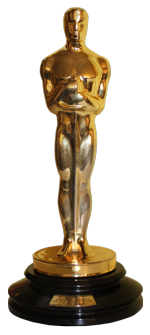Academy Awards
Oscars Awarded for Excellence in cinematic achievements

The Academy Awards, or "Oscars", is an annual American awards ceremony honoring cinematic achievements in the film industry. The various category winners are awarded a copy of a statuette, officially called the Academy Award of Merit, which has become commonly known by its nickname "Oscar". The awards, first presented in 1929 at the Hollywood Roosevelt Hotel, are overseen by the Academy of Motion Picture Arts and Sciences (AMPAS). The awards ceremony was first televised in 1953, and is now seen live in more than 200 countries. The Oscars is the oldest entertainment awards ceremony; its equivalents, the Emmy Awards for television, the Tony Awards for theatre, and the Grammy Awards for music and recording, are modeled after the Academy Awards.
The 86th Academy Awards ceremony was held on March 2, 2014, at the Dolby Theatre in Los Angeles, later than usual as to not clash with the Winter Olympics in Sochi, Russia.The 87th Academy Awards ceremony was held on February 22, 2015. Historically given during the first quarter of the new year, the awards honor achievements for cinematic accomplishments for the preceding year. For example, 12 Years a Slave was awarded Best Picture for 2013, although the Oscar ceremony was conducted in 2014. As of the 87th awards ceremony, held in 2015, a total of 2,947 Oscars have been awarded since the inception of the award.
The first Academy Awards presentation was held on May 16, 1929, at a private dinner at the Hollywood Roosevelt Hotel with an audience of about 270 people. The post-awards party was held at the Mayfair Hotel. The cost of guest tickets for that night's ceremony was $5 ($69 in 2016 dollars). Fifteen statuettes were awarded, honoring artists, directors and other participants in the film-making industry of the time, for their works during the 1927–28 period. The ceremony ran for 15 minutes.
Winners had been announced to media three months earlier; however, that was changed for the second ceremony in 1930. Since then, for the rest of the first decade, the results were given to newspapers for publication at 11:00 pm on the night of the awards. This method was used until an occasion when the Los Angeles Times announced the winners before the ceremony began; as a result, the Academy has, since 1941, used a sealed envelope to reveal the name of the winners.
The first Best Actor awarded was Emil Jannings, for his performances in The Last Command and The Way of All Flesh. He had to return to Europe before the ceremony, so the Academy agreed to give him the prize earlier; this made him the first Academy Award winner in history. At that time, the winners were recognized for all of their work done in a certain category during the qualifying period; for example, Jannings received the award for two movies in which he starred during that period, and Janet Gaynor later won a single Oscar for performances in three films. With the fourth ceremony, however, the system changed, and professionals were honored for a specific performance in a single film. For the first six ceremonies, the eligibility period spanned two calendar years.
At the 29th ceremony, held on March 27, 1957, the Best Foreign Language Film category was introduced. Until then, foreign-language films had been honored with the Special Achievement Award.
The 74th Academy Awards, held in 2002, presented the first Academy Award for Best Animated Feature.
All Academy Awards ceremonies always end with the Best Picture award.
